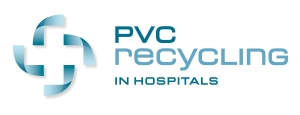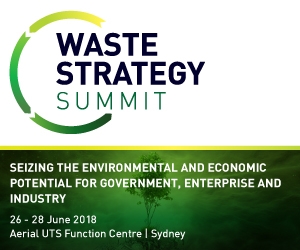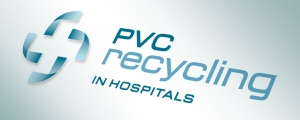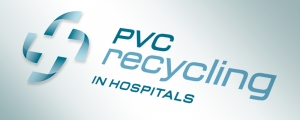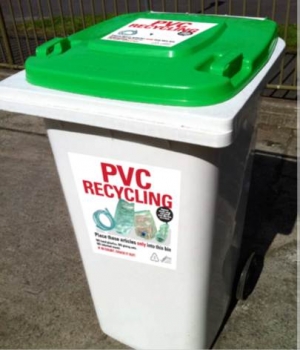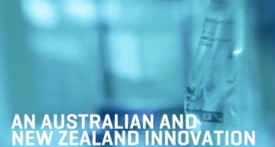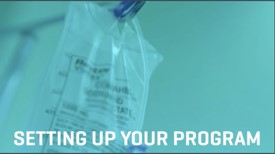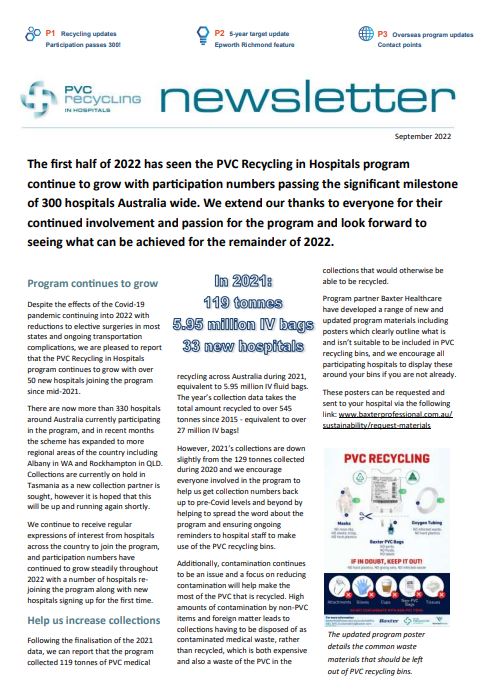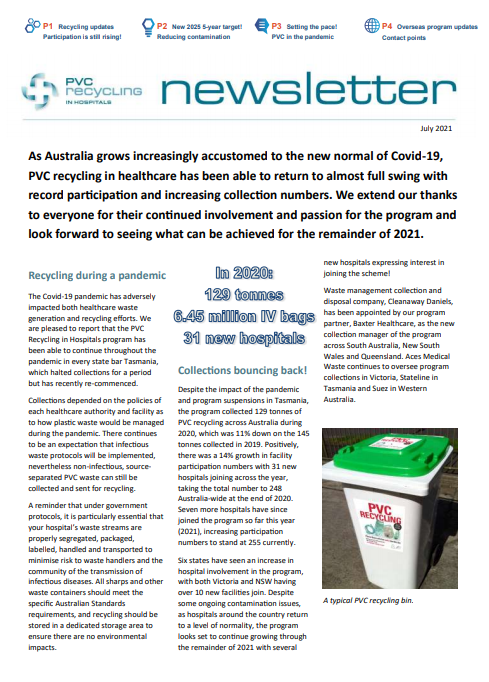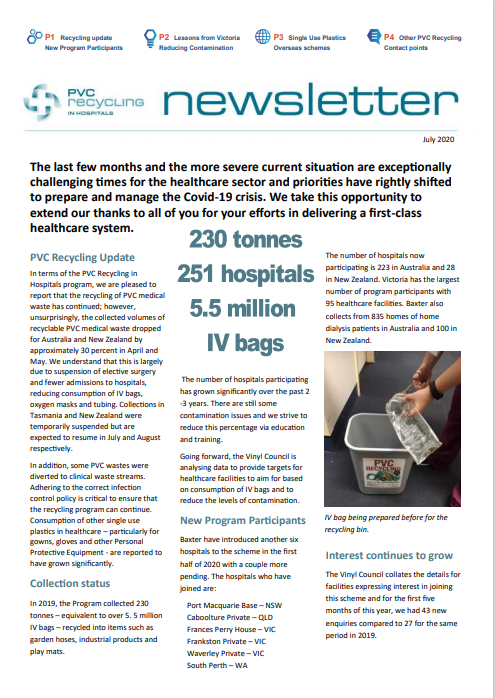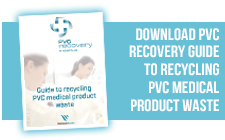PVC Recycling in Hospitals program: 150-hospital target in 2018
The Vinyl Council of Australia aims to expand its successful PVC Recycling in Hospitals program to cover 150 hospitals by the end of 2018.
Since its launch in 2009, the innovative waste management and recycling program has grown to operate in 138 hospitals throughout Australia and New Zealand. It is managed by the Vinyl Council of Australia and its member partners – Baxter Healthcare, Aces Medical Waste and Welvic Australia.
Over the past year, more than 200 tonnes of high-grade PVC waste from hospitals has been diverted from landfill to recycling. This material is redirected to reprocessors in Australia. Australian and New Zealand manufacturers use the recycled polymer in new goods, such as garden hoses and outdoor playground matting.
The program partners are also exploring design of new product applications to accept the growing volume of recyclate generated through the thriving program.
Commenting on their target, Vinyl Council Chief Executive Sophi MacMillan says: “Thanks to great support and enthusiasm from healthcare professionals, the PVC Recycling in Hospitals program is now operating in every state in Australia except the Northern Territory.
“It’s a great example of how the healthcare sector can demonstrate leadership in PVC sustainability and recover high quality material that can be genuinely recycled locally for use in new products. We are currently looking at further end product applications for the recyclate.
“New South Wales is one of our priorities given it only has 11 hospitals participating in the program at the moment. As the state with the biggest population in Australia, the opportunity to grow the program there is really good.”
As part of their drive to encourage greater participation and explain how the program works, Vinyl Council representatives are attending the NSW Nurses and Midwives’ Association Annual Conference in Sydney from 25 to 27 July 2018.
Taking the ‘squiggle’ out of developing recycling solutions
Fostering innovation in recycling and encouraging circularity of materials in the economy is a challenging and complex endeavour, The Vinyl Council has been engaged in such activity for several years, working with members of the vinyl value chain to facilitate solutions to end-of-life PVC products.
Industry Recycling Strategy Manager, Helen Millicer will be presenting on this topic at the 2018 Waste Strategy Summit to be held in Sydney 26-28 June.
On 28 June, in a presentation entitled 'Pilots and Collaborators – taking the ‘squiggle’ out of developing recycling solutions', Helen will share how the Council works to collaborate widely with stakeholders to develop innovative approaches to waste recovery and recycling. As an example, she will outline the challenges and successes of initiating and managing a project to divert a complex end-of-life vinyl product from landfill and find beneficial uses for the raw materials.
Her talk will cover:
• How to implement concrete and effective recycling solutions in organisations
• Understanding the importance of collaboration between industries, organisations and governments in developing recycling strategy
• Learning how to take maximise the chance of success and take the 'squiggle' out of the process
• Some of the exciting possibilities of PVC recycling in Australia
Helen will then participate in a panel session with a number of experts.
Made locally. Recycled locally. PVC Recycling in Hospitals program leads the way in circular economy
The Vinyl Council of Australia wishes to clarify some recent reports about its increasingly successful PVC Recycling in Hospitals program.
Managed by the Vinyl Council of Australia and its member partners in the program – Baxter Healthcare, Aces Medical Waste and Welvic Australia – the PVC Recycling in Hospitals program is a local initiative to redirect high-grade PVC waste from hospitals to local recycling companies to be reprocessed in Australia and sold to Australian and New Zealand manufacturers who produce new, finished products such as garden hoses and outdoor playground matting.
Unlike other commercial and residential programs in Australia and New Zealand, the PVC Recycling in Hospitals program processes and recycles PVC material here in Australia, closing the loop on the manufacture, supply and disposal of PVC products in hospitals.
Thanks to the support and enthusiasm of hospitals, nurses and other healthcare professionals in Australia and New Zealand, the PVC Recycling in Hospitals program has now grown to more than 130 hospitals.
Over the past 12 months almost 200 tonnes of PVC waste from hospitals has been diverted from landfill to recycling.
At a time when residential recycling programs are under enormous pressure due to significant changes to waste management policies in China and its decision to restrict the importation of unsorted waste from other countries, the Vinyl Council confirms its PVC Recycling in Hospitals program remains unaffected by these changes in international waste management. We are proud that our industry program continues to lead by example as a local, innovative waste management and recycling program.
To support the growth of the PVC Recycling in Hospitals program, Welvic made a significant investment in modern recycling equipment last year and has created six new jobs at its Victorian PVC compounding plant.
Baxter Healthcare, a local manufacturer of hospital IV fluids bags, has also invested in education and training in the healthcare sector and provides logistics support.
"We seek to assure the healthcare sector and its staff that the PVC Recycling in Hospitals program is strong and is not affected by China’s ban on unsorted materials. All the medical waste collected under the program has always been, and continues to be, reprocessed and used here or in New Zealand," said Vinyl Council's CEO Sophi MacMillan.
"This example-setting program is growing precisely because it is supported by the local vinyl manufacturing industry and the healthcare sector as product consumers. It is a clear demonstration that circularity within Australia can work."
The Vinyl Council is calling on other industries and manufacturers to support the program and for measures to strengthen the local recycling industry.
"We would like to see greater support and incentives from government to encourage local design and manufacturing of products that use recyclate, to drive demand for recyclate use in Australia,” said Sophi.
“And we’d like policies to encourage procurement of those products that demonstrate they are closing the circularity gap in Australia.”
Banksia Awards: ‘PVC a good material for a circular economy’
The 2017 Banksia Award Judges have released their assessments of the PVC Recycling in Hospitals Program initiated by the Vinyl Council of Australia.
Describing the scheme as a ‘world first’, the judges praised it as an ‘excellent case study of an industry's response to keeping its social license’ and ‘embracing product stewardship’ as its means to achieve that.
The PVC Recycling in Hospitals Program was one of five Australian finalists for the Circular Economy category at the Awards night in November 2017. While not winning against tough competition in this category, the extremely positive feedback from the judges on our award submission has given the Vinyl Council of Australia team much encouragement to take this successful medical plastic recycling scheme - now operational in more than 120 hospitals in Australia and New Zealand - to even greater heights. The scheme is aiming to recycle a total of 2,500 tonnes per year throughout Australia.
They also commended the ‘good leadership shown by the health industry and good collaboration between industries’, as well as recognising ‘good circularity – PVC is a good material for a circular economy’.
Established in 2009, the program has overcome challenges to divert quality PVC from landfill. Two Vinyl Council members, Baxter Healthcare (multinational and Australian-based manufacturer of IV bags) and Welvic Australia (Australian compounder), collect and recycle IV bags, oxygen masks and oxygen tubing. These are turned into into durable, locally-manufactured products such as industrial and garden hose and children’s playground mats.
Recognising this, the judges stated: “The program stands out as a unique solution taking a waste stream that would historically go to landfill and re-purposing it thus preventing virgin components required for new products.
“The issue of plastics and chemical use in hospitals is enormous and the lack of sustainability focus in that sector is well-known. Seeing a project that brings change to that sort of culture is great. Overall it’s an innovative solution filling a niche that can be expanded globally and sets an example.”
Vinyl Council Chief Executive Sophi MacMillan comments: “We appreciate this valuable feedback and agree completely with the judges’ view that there is much potential to scale this and expand it across other industries. Watch this space!”
PVC Recycling in Hospitals scheme shortlisted for Circular Economy award
The Vinyl Council of Australia’s hugely-successful hospitals’ recycling scheme has been shortlisted in the Circular Economy category of the Banksia Foundation Awards 2017.
From its earliest beginnings in 2009, the scheme has overcome challenges to embrace more than 80 hospitals in Australia and 28 in New Zealand. IV bags, face masks and oxygen tubing are collected and recycled by two Vinyl Council members Baxter (multinational and Australian-based manufacturer of IV bags) and Welvic (Australian compounder).
Significant investment and commitment by these two companies and the Council has helped the PVC Recycling in Hospitals scheme to flourish and divert quality PVC from landfill into durable, locally-manufactured products. These include industrial and garden hose in Australia and children’s playground mats in New Zealand, which are exported to Australia and around the Pacific.
It is also being replicated round the world. For example, in the UK 11 hospitals are participating in the growing RecoMed PVC recycling scheme with high-quality medical grade plastic being recycled into horticultural products.
The Vinyl Council’s PVC Recycling Project Manager, Helen Millicer said: “We are thrilled to have been shortlisted for this sustainability award. In terms of significance, this Australian initiative shows that quality material from hospitals can be safely recovered and reprocessed to become durable, locally-made product in Australia and in other parts of the world.
“There is no limit to the demand for this high-quality material as a substitute for virgin in Australia and New Zealand. It’s a great step forward in terms of sustainability for PVC and the environment. It’s a valuable raw material resource that can be given a useful ‘second life’ in new products and that’s good news all round!”
The scheme is aiming to recycle a total of 2,500 tonnes per year throughout Australia. Currently, monthly PVC quantities from both hospitals and home patients (Australia & New Zealand) produces enough for 95 km of garden hose or 4500 cushioned play mats for children’s playgrounds. This displaces 14 tonnes a month of imported PVC resin and additives, and reduces greenhouse gas emissions associated with the PVC in new products by 80 percent.
Winners will be announced at the Banksia Awards ceremony in Sydney on 1 November.
In Healthcare - PVC Recycling in Hospitals
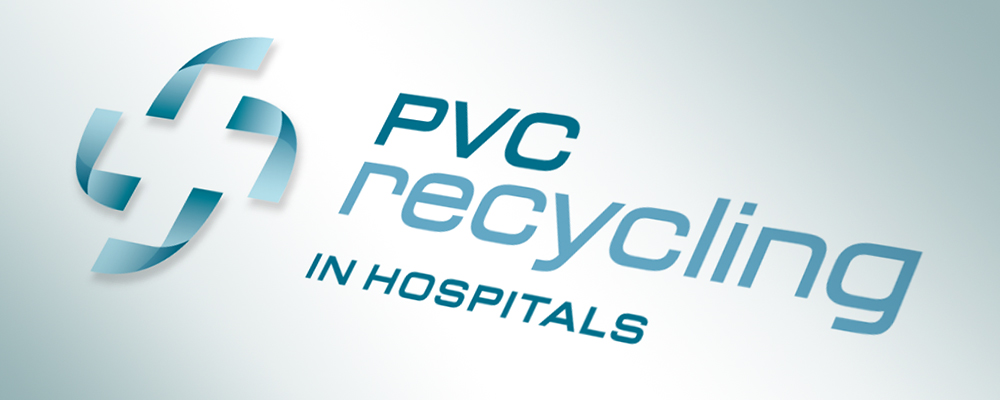
PVC Recycling in Hospitals
The PVC Recycling in Hospitals program collects specific, used PVC medical products for recycling safely into useful new products.
Initiated in Australia by the Vinyl Council in collaboration with staff at a metropolitan hospital, the program collects PVC IV bags, face masks and oxygen tubing it is now operating in over 280 hospitals and healthcare facilities in Australia and New Zealand.
These PVC, or vinyl, medical products are readily recyclable due to the quality and transparency of the polymer and the large number of items in use daily. Over 50 million IV bags are consumed annually in Australia alone. Together with the face masks and tubing, at least 2,500 tonnes of locally recyclable material is available for collection and reprocessing.
A 300 bed hospital could easily recycle around 2.5 tonnes of these quality PVC products each year.
Plastics are a significant share of hospital general waste currently sent to landfill at a cost to the hospital, and PVC is the most commonly used polymer in medical products.
At the initiative of an anaethetist, the PVC Recycling in Hospitals program started as a pilot program in 2009 at Western Health, Victoria. The Vinyl Council developed the program in collaboration with Western Health, and is proud to support its growth with members including Baxter Healthcare, Welvic Australia and transport companies and government agencies. It has grown to service hospitals in across Australia, and in New Zealand. It is aslo winning awards: 2017 Banksia Foundation Circular Economy Finalist; 2016 Victorian Premier's Sustainability Awards Finalist, and our participating hospitals are winners in the Victorian Awards in 2016 and 2017. Inquiries continue to come from across Australia and the world.
The material is reprocessed by Vinyl Council member, Welvic in Australia and MattaProducts in New Zealand. It is primarily used in new industrial and garden hoses and play and safety mats for children and workplaces.
Each tonne of recycled PVC will replace about one tonne of virgin PVC compound in new products, consuming 80% less energy and reducing carbon emissions.
Start PVC Recycling in Your Hospital
|
Watch these videos to learn how and why to set up your program |
Read Latest Program News:September 2022 Newsletter
July 2021 Newsletter
July 2020 Newsletter
Subscribe to Medical Newsletter |
Resources to help set up your PVC Recycling program:The following booklet, training slides, poster and videos have been designed to help hospitals set up and implement PVC Recycling in Hospitals effectively and efficiently. DOWNLOAD the Fact Sheets for staff here DOWNLOAD the Training slides here DOWNLOAD the PVC Recycling Poster here The Business Case for PVC Recycling, prepared by the Victorian Department of Health and Human Services, April 2017. |



